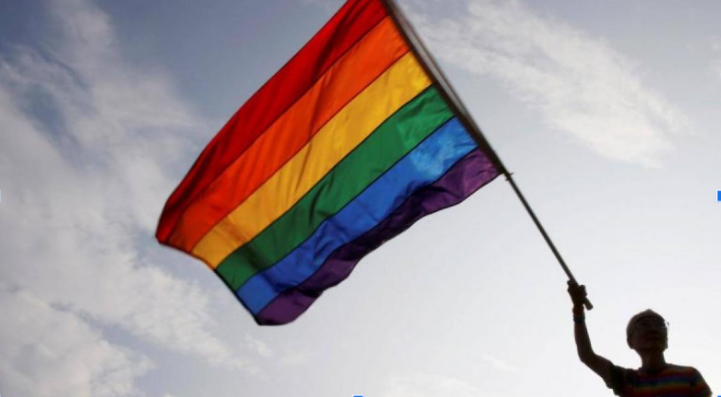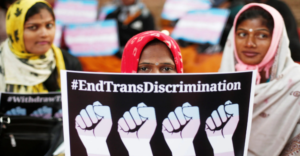INTRODUCTION
The ideation around queer relationships and marriages has been stirring the mainstream for quite some time. While gay relationships have been recognized in most developed countries, the debate for granting legal recognition for the same still stays debatable in some. The awareness around the queer community and their rights have been disseminated through various media houses, and activists through the celebration of Pride Month, marches, seminars, journals, etc.
The debate around same-sex marriage heated up in India after the Hon’ble Supreme Court announced the setting up of a Constitutional Bench on April 15th, 2023 regarding the same. The 5- member Bench is headed by Chief Justice of India, DY Chandrachud with 4 other members namely, Justices Sanjay Kishan Kaul, S. Ravindra Bhat, Hima Kohli, and P.S. Narasimha.
The setting up of the Bench was made in the light that marriage equality for all required Constitutional Amendment and petitions about it had been long due. DY Chandrachud remarked that gender is not just about where one’s ‘genitals’ are, it is far more complex.
The aim was to ensure that every citizen of India entitled to the same sets of rights was treated equally in all fairness with the view to secure LGBT rights as well. The hearing for the legalization of gay marriage began on April 19th, 2023.
INTRODUCTION
The ideation around queer relationships and marriages has been stirring the mainstream for quite some time. While gay relationships have been recognized in most developed countries, the debate for granting legal recognition for the same still stays debatable in some. The awareness around the queer community and their rights have been disseminated through various media houses, and activists through the celebration of Pride Month, marches, seminars, journals, etc.
The debate around same-sex marriage heated up in India after the Hon’ble Supreme Court announced the setting up of a Constitutional Bench on April 15th, 2023 regarding the same. The 5- member Bench is headed by Chief Justice of India, DY Chandrachud with 4 other members namely, Justices Sanjay Kishan Kaul, S. Ravindra Bhat, Hima Kohli, and P.S. Narasimha.
The setting up of the Bench was made in the light that marriage equality for all required Constitutional Amendment and petitions about it had been long due. DY Chandrachud remarked that gender is not just about where one’s ‘genitals’ are, it is far more complex.
The aim was to ensure that every citizen of India entitled to the same sets of rights was treated equally in all fairness with the view to secure LGBT rights as well. The hearing for the legalization of gay marriage began on April 19th, 2023.
BACKGROUND AND HISTORY
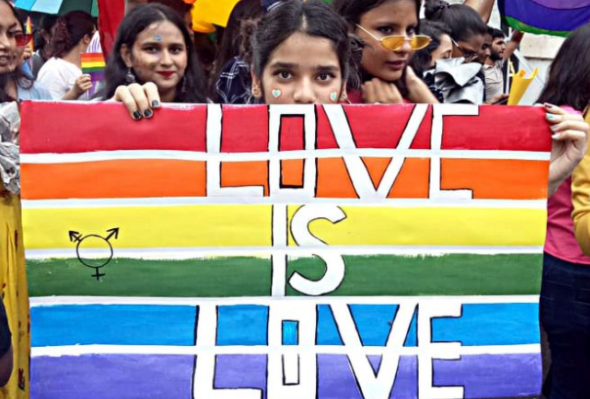
Homosexuality has always been a part of our India Culture since times immemorial. Whether it is Shikandini in Mahabharata or erotic sculptures in Khujrao depicting non-binary relations, homosexual relationships have always graced the horizon in India. Ancient manuscripts and Rig Veda have also talked about such queer relationships and women adorning other women. Not only this but there have been instances quoted in our old manuscripts of a Muslim poet falling in love with a Hindu boy.
However, due to rising Vedic Brahminism and British colonialism, this ‘part’ of our culture began to be seen as ‘unnatural’ and ‘obscene’. Homosexuality, as an honourable union started to fade away in the abysm of time. Later, punishments like whipping and beating in public were hurled at those who engaged in such activities. This hatred for the LGBTQIA+ community can be seen as rooted in the mindset of the people even today.
However, the Netherlands became the first country to legalize the civil union of non-binary people in 2000. Later, Belgium(2003), Canada(2005), Spain(2005) and South Africa(2006) followed. As of today, 30 countries all across the globe have recognized same-sex marriages whilst granting legal rights to them.
The entire world sets its eyes on India which could be the first country in Asia to legalize same-sex marriage. With the legalization of gay relations in 2018, the members of the LGBTQIA+ and its allies community look up to the wisdom of the jury to mark the ruling in their favour. The Hon’ble Supreme Court with its 6th hearing on the 27th of April, 2023 could be proceeding towards making a historical judgement.
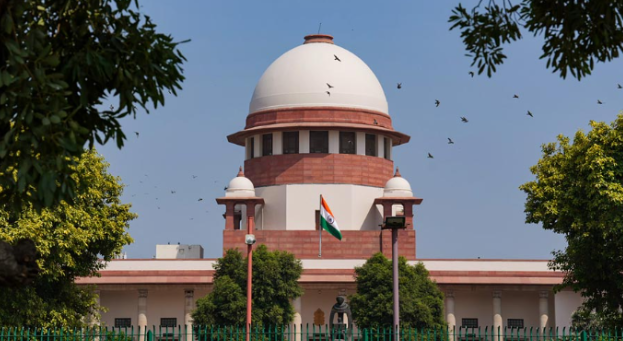
ARGUMENTS IN FAVOUR-
- CONSTITUTIONALLY PROTECTED FUNDAMENTAL RIGHT
The biggest argument that has been levelled in this case has been that the protection of people from the queer community is already covered under the rights assured by the Constitution. Our Constitution supports the idea of liberty, privacy, and equality before the law. The right to marry a person of our choice is a fundamental right, i.e. any person above 18 years of age can marry a person of their choice in the sovereign Republic of India. Then why do the tables turn when it comes to the LGBTIA+ community? The seeking of legal recognition of homosexual couples is in line with the underlying principles of the Constitution aiming to secure LGBT rights.
- LAW CHANGES ATTITUDE
The main idea behind the legal recognition of same-sex marriage stems from the social acceptance of such relations. When this civil union goes through thorough legislation and rigorous implementation through the systemic structure, people will understand and comprehend the rationale behind it. In India, while citizens might have their grievances from the Court at times, most of them still look up to the wisdom of the Hon’ble Supreme Court and decisions taken by them are welcomed by all.
A study shows that decriminalizing gay relationships by scraping Section 377 has led to a greater audience accepting their presence in society and their respectful recognition. After the legislation in 2018, people from the community have started to feel more empowered, confident, and driven to come out to the mainstream public. Such trends set the right path toward building a more inclusive environment for one and all.
- ENTITLEMENT TO OTHER RIGHTS-
Senior advocate Menaka Guruswamy during the hearing of the Supreme Court argued that “Marriage is not only a question of dignity, it is also a bouquet of rights.” Marriage, as an institution, assures both the parties involved -the right to acquire property in joint name, own bank accounts, and lockers, nominate each other as nominees for life and other insurances, etc. The present scenario does not allow couples from the LGBTQIA+ community to exercise such rights because they have not been legally recognized. Therefore, the legalization of queer marriages in India becomes even more critical.
- QUEER INDIAN HISTORY
Historians like Harbans Mukhia mention how the British banned homosexuality because they had orthodox Christian values. The presence of homosexual relations has been evident in ancient India. The book, ‘KamaSutra’ explicitly has tales of individuals of the same sex entangling in romantic relationships. Devdutt Pattnaik has authored two male lords, Mitr and Varun who gave birth to a child together in his work. Ancient India accepted love in all its forms with open arms. Mubarak, the son of Alauddin Khilji is also known to have a relationship with one of the noblemen of his Court. Thus, our history has always had non-binary encounters and romantic relations and it is not an ideation influenced by the ‘WEST’.
- BRAIN DRAIN
As a consequence of the present socio-legal system, individuals from the LGBTQIA+ community cannot marry or hope to live an everlasting love life together within the territorial boundaries of India. As a result, most of them shift to Western countries which offer water-tight protection and legal recognition of their marital status. This is leading to a brain drain from Indian and other South-Asian countries as some of the best minds leave their homeland.
The minds which could have been otherwise helpful in fostering the growth of our nation are now engaged in active services to the governments of other nations. This active brain drain is costing India much more as extremely talented Queer Icons leave their abode seeking legal protection.
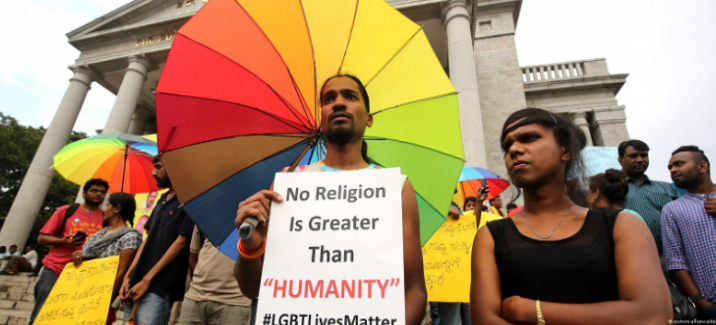
ARGUMENTS IN OPPOSITION-
- CHALLENGES THE FUNDAMENTAL FABRICS OF OUR CULTURE
The Centre represented by Solicitor General Tushar Mehta argues that the legalization of same-sex marriages is against the most fundamental concept of our Indian civil society, FAMILY. The institution of marriage requires two people of different sexes tied together in a sacred union who are capable of procreating.
With the legalization of homosexual marriages, the core beliefs of this notion are being challenged as the union will not be between the two sexes, male and female. Representatives of the Centre called out the entire process of seeking legal acknowledgement as a reciprocation of the ‘WEST’ while forgetting our roots ingrained in the Indian culture.
- INDIA-NOT READY
The proponents of this argument state that most countries that have been successful in the legalization of gay marriage are countries with higher economic status. With better lifestyles and rich quality of education and awareness, they have been more open and accepting of the more ‘unconventional forms’ of love. On the contrary, Asian countries like India etc, fall in the lower bracket of economic growth and development.
Some members of the community believe that their lives have barely changed even after the landmark resolution of 2018 because they continue to face discrimination everywhere. Individuals still fear coming out to their Indian families who might make them go through ‘conversion therapies’ for the same. They believe that making homosexual marriages legal might not be the first step towards attaining LGBT rights. Instead, anti-discrimination policies should be brought out first by the government which educates the masses.
- RELIGIOUS BELIEFS-
In India, where almost more than 80% of the general population derives its identity through their religion, the role of religious beliefs becomes very significant. Many religions are against the idea of homosexuality. The All-India Muslim Personal Law Board opposed homosexuality terming it ‘immoral’. The General Secretary of RSS has also backed the Centre’s stance on marriage equality. Most of the Indians who associate with their religious beliefs state that if the legalization of gay marriage is not acceptable to their religions, how can it be acceptable to them? The rigid beliefs within religious structures in India continue to dominate the social circle of Indian civil society.
- CONFUSED GENDER ROLES
Solicitor General Tushar Mehta on Day 6 of the hearing argued as to how would the gender roles be decided. If marriage is permitted with adoption, who would be treated as the father and the mother? In the case of marriage between lesbians, who would be the wife? The government says that it would be difficult to establish strict adherence to specific gender-based roles and obligations related to them when the sexes are not the same as gender. The Central Government stated that the decision on LGBT rights must be made through the Parliament after debates and not through the judiciary system. The Centre’s stance remains that government will make laws catering to its impact on all sections of society.
WHAT’S NEXT?
While the hearing goes on in the Supreme Court, the impact of this legislation could be massive. The Bar Council of India has urged the Supreme Court of India to leave this issue for ‘legislative consideration’. On the other hand, it has also fostered a debate among the Indian masses about the proceedings of the Hon’ble Supreme Court and its probable decision.
While activists have been actively advocating for LGBT rights, there has been a massive section of Indian society that has come out in support as well as against it. Religious fundamentalist bodies continue to oppose such unions. Our question of acceptance of such relations lies beyond it.
While homosexual marriages may be legalized in India, the queer community continues to face a lot of resistance and backlash from our common brethren. The rigid adherence of people to their narrow beliefs serves as an impediment to achieving marriage equality in its true sense. Chief Justice of India, DY Chandrachud has clarified that the hearing’s scope would be limited to developing a notion of a ‘civil union’ that finds legal recognition under the Special Marriage Act, and not within the personal law Boards and issues. The fate of the hearing is yet to unfold itself.
CONCLUSION-
The ideation around homosexuality continues to be in rampant debates. If legal recognition is granted to queer couples, India would be making a historical landmark in the history of queer justice while actively becoming a significant flag-bearer of LGBT rights. A precedent would be set in the arena of ensuring justice and equality for all. As the days of the proceedings pass, everyone eyes the judgment of the Hon’ble Supreme Court hoping to hear righteousness prevailing. However irrespective of the judgment, we need to form an inclusive environment for all the members of the community. Also do watch out for our follow-up article on the same.
-Bhawini Srivastava
Must Read: APRIL- Sexual Assault Awareness Month

